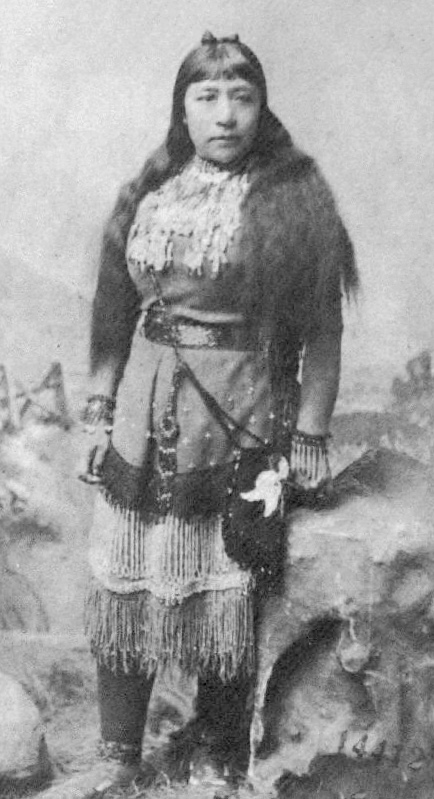During the month of March, in recognition of Women's History Month, Native News Online will feature various Native American women who have contributed to the betterment of Indian Country.

Sarah Winnemucca (Northern Paiute) 1844-1891
Sarah Winnemucca (Northern Paiute) was an early advocate for Native American rights during a time when the federal government was actively campaigning for the extermination of Native peoples.
Winnemucca was born in 1844 near Humbolt Lake, Nevada. Her family was influential in their community, taking the lead in trying to form positive relationships with arriving colonizers. In 1859, the Northern Pauite — a nomadic tribe — was forced to settle on the Pyramid Lake reservation in Nevada. The tribe was expected to adapt to Western agricultural practices and farm the land with supplies provided by the government; however, as was common practice at the time, government agents sold the farming supplies intended for the Northern Paiute, leaving the tribe with no resources.
After the first winter in which many Northern Pauite starved to death,
Winnemucca begged military leaders at Nevada's Camp McDermit for help. Wagonloads of supplies were sent to the reservation, and Winnemucca was hired as a military interpreter.
Winnemucca would act as an interpreter between her people and the government for many years.
In the aftermath of the 1860 Pauite War, in which the Pauite prevailed in conflict with settlers, the U.S. government created the Nevada territory and gave the governor carte blanche to keep the Pauite under control.
Winnemucca interpretered between her people and the Nevada government, using her position to advocate for the survival of the Northern Paiute.
The government forcibly moved surviving members of the tribe to the Malheur Reservation in Oregon in 1868. In 1871 at the age of 27, Winnemucca began working for the Bureau of Indian Affairs, again as an interpreter between her people and the U.S. government. As well, she was also one of the first teachers at a school opened on the Malheur Reservation.
When a new government agent took over managing the Malheur Reservation and sought to force the Northern Paiute to submit to white rule fully, Winnemucca was fired from her teaching position for advocating for her people. Shortly after, the Northern Paiute were forced to relocate again to the Yakama Reservation in Washington Territory.
Winnemucca wrote letters to the U.S. govermnent, organized petitions and even traveled to Washington D.C. in 1880 where she met with the Secretary of the Interior, asking for her people to be allowed to return to the Malheur Reservation.
Her request was denied, and for all of her attempts at positive relationships with the U.S. government, Winnemucca was inspired to tell people the truth about the Indian Removal Act. She began lecturing in San Fransisco, exposing white audiences to the realities of what Native Americans were enduring at the hands of the government. She also taught audiences about the history and culture of her people. Her lectures are credited for exposing many Americans to Indigenous culture for the first time. Winnemucca gave more than 300 lectures in her time, speaking plainly about white settlers destroying Native communities and challenging the romanticized idea of Anglo-American settlers.
In 1883, she published an autobiography, Life Among the Paiutes: Their Wrongs and Claims. Part memoir, part accounting of Paiute history and the dark legacy of federal lands, the book is credited as the first autobiography written by an Indigenous woman in the U.S. In the book, she wrote, "Since the war of 1860, there have been one hundred and three (103) of my people murdered, and our reservation taken from us; and yet we, who are called blood-seeking savages, are keeping our promises to the government. Oh, my dear good Christian people, how long are you going to stand by and see us suffer at your hands?"
Winnemucca died in 1891. Her legacy is complicated, as her interpreter roles were seen by some as a betrayal of her people. In 1885, she was quoted as saying, "I have not contended for Democrat, Republican, Protestant or Baptist for an agent. I have worked for freedom; I have labored to give my race a voice in the affairs of the nation."
Her lectures undoubtedly brought to light the realities of the government's attempt to eradicate Native Americans and introduced people to Indigenous culture, which they otherwise would never encounter outside of crude government campaigns.
More Stories Like This
Native News Weekly (August 25, 2024): D.C. BriefsUS Presidents in Their Own Words Concerning American Indians
NDAA passes House; Lumbee Fairness Act Advances
NFL, Vikings to Host Native All-American Game, Youth Flag Clinic
Senate Committee on Indian Affairs Passes 12 Bills to Strengthen Tribal Communities
Help us defend tribal sovereignty.
At Native News Online, our mission is rooted in telling the stories that strengthen sovereignty and uplift Indigenous voices — not just at year’s end, but every single day.
Because of your generosity last year, we were able to keep our reporters on the ground in tribal communities, at national gatherings and in the halls of Congress — covering the issues that matter most to Indian Country: sovereignty, culture, education, health and economic opportunity.
That support sustained us through a tough year in 2025. Now, as we look to the year ahead, we need your help right now to ensure warrior journalism remains strong — reporting that defends tribal sovereignty, amplifies Native truth, and holds power accountable.
 The stakes couldn't be higher. Your support keeps Native voices heard, Native stories told and Native sovereignty defended.
The stakes couldn't be higher. Your support keeps Native voices heard, Native stories told and Native sovereignty defended.
Stand with Warrior Journalism today.
Levi Rickert (Potawatomi), Editor & Publisher


